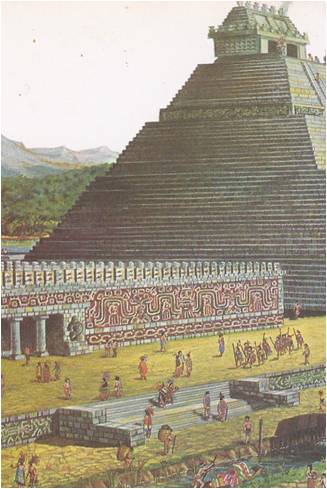“I DID NOT come to till the soil like a peasant,” said Hernando Cortez. “I came to find gold.” His words echoed the thoughts of almost every Spaniard in the New World. The discovery of the sea route to the West had set off a great treasure hunt. Colonizing and slaughtering, building and plundering, the gold-hungry Spaniards won a Spanish Empire of the West. Conquistadores‚ they were called — the conquerors. None of the treasure-hunters was more cunning or ambitious than Hernando Cortez‚ who came to the island of Hispaniola in 1504. It was not until 1519 that the governor of Hispaniola sent him on an expedition to explore the coast of Central America. Cortez sailed with five ships, 500 soldiers, eleven cannon and fifteen horses. The fleet anchored near the coast of the territory called Mexico and the men went ashore to build a settlement. Cortez ordered the ships dismantled so that none of his men could go back to Hispaniola, then set off on a march inland. Mexico was a vast country whose Indians had built a highly organized civilization and Cortez had a force of less than 500 men. He was a skillful leader; besides, he had firearms and horses –and good luck. Not long after he began his march, a horde of Indians swept out of the hills to attack the Spaniards. As soon as the Spanish cavalry appeared, the Indians fled to safety. As one soldier later wrote, the Indians, “who had never before seen a horse, thought that steed and rider were one creature.” One tribe after another surrendered. They had been conquered by the people called the Aztecs and many of them offered to join Cortez in the fight to destroy the Aztec empire. As the Spaniards and their Indian allies pushed on …
Read More »England’s Elizabeth: Queen of Words and Music 1511 – 1603
In 1600, the Duke Virginio Orsini‚ nephew of the Medici ruler of Florence, arrived in England. He came to spend the New Year’s holidays and to see for himself the woman who fascinated all Europe. She was Elizabeth, queen of England and she was already a legend. To aristocratic travelers, such as the Duke Orsini, she was the most important tourist sight in England. Years later, she would still be as fascinating as any woman in history, for in her time — the Elizabethan Age — her country flourished as never before and the Renaissance blossomed in England. As a girl of twenty-five, Elizabeth had come to the throne of a kingdom torn by religious hatred and civil wars. Her towns were poverty stricken, her farmlands unsown and her army and navy devastated by a series of disastrous foreign wars. Her subjects were weary and confused after years in which short-lived monarchs had alternately honoured and defied the pope and the church of England had split away from the church at Rome. Across the English Channel, the kings of France, Spain and other Catholic nations prepared to attack. They were sure that England, with only a woman to lead it, would soon be easily conquered. THE “FLORENTINE” QUEEN Yet forty years later, when the Duke Orsini came to London, Elizabeth was still queen, the ruler of a kingdom as great as any in Europe. This seeming miracle was the queen’s own doing. “I know I have but the body of a weak and feeble woman,” she had told her people, “but I have the heart and stomach of a king.” She had lived up to her words, for she proved to have the commanding air of her kingly father and grandfather, Henry VIII and Henry VII. England had never known …
Read More »The Rise of Nationalism 1272 – l485
JOAN OF ARC did more than inspire the French to drive out the English; her words and actions helped to advance a new idea. During most of the Middle Ages, people did not think of themselves as belonging to a nation. They thought of themselves as members of a church and subjects of a lord. Then, as trade increased, as towns and cities grew‚ as merchants’ and craftsmen’s guilds were formed‚ the forms of society began to change. The barons began to lose some of their power‚ while the kings gained more. Gradually, people begin to think of themselves as part of a nation and a new idea rose — the idea of nationalism. Joan fought not for a single lord or a single community. She fought for France as a whole, for France as a nation and her allegiance was to the king as head of that nation. It was this, as much as her success on the battlefield that frightened the barons of England and made the nobles of France uneasy. They realized that once the idea of nationalism took hold, feudalism would be done for and they with it. Nationalism grew stronger as kings grew stronger; a strong monarch unified his people and gave them a feeling of belonging to a nation. The barons did not give up their power easily and often there were rivals for the throne. In England this led to a long period of conflict known as the Wars of the Roses, which from 1455 to 1485. The name came from the emblems of the two families that that fought to rule England. The emblem of the house of York was a white rose; the emblem of the house of Lancaster, a red rose. The causes of the struggle between the two families …
Read More »


